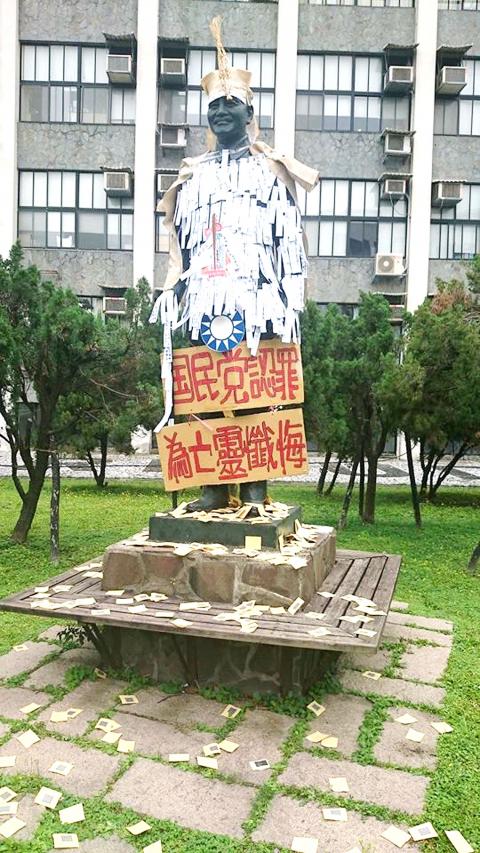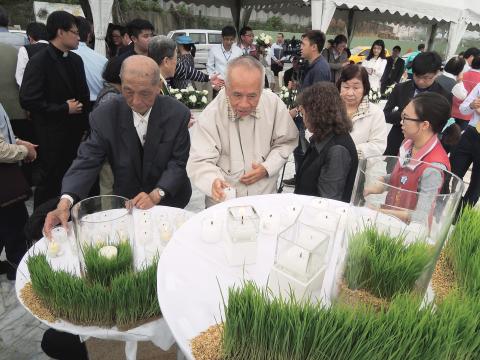With the 68th anniversary of the 228 Incident approaching, President Ma Ying-jeou’s (馬英九) administration has come under fire from Academia Sinica modern history researcher Chen Yi-shen (陳儀深), who said the administration is misrepresenting history and mitigating the Chinese Nationalist Party’s (KMT) responsibility for the 228 Incident.
The very nature of the 228 Incident, a historical tragedy that is the by-product of a clash of different ethnicities, is that it was a massacre of civilians by the KMT government, Chen said.
The 228 Incident refers to an uprising that began on Feb. 27, 1947, against the then-KMT authoritarian regime and the resulting brutal crackdown that left tens of thousands dead and led to nearly four decades of martial law.

Screen grab from Internet
The KMT government under then-Taiwan governor Chen Yi (陳儀) pursued a policy of demilitarizing local villages and arresting alleged criminals based on a list provided by villagers informing on each other, Chen Yi-shen said.
Many innocent people were implicated, and even some of the civilians who were on the committee handling the issue were later arrested, Chen Yi-shen said.
There was an element of using the Incident as a way to exact personal revenge, and the 228 Incident was in essence a vindictive slaughter by the KMT government, Chen Yi-shen said.

Photo: Ting Wei-chieh, Taipei Times
When Ma — in his capacity then as KMT chairperson — defined the event on the party’s Central Standing Committee meeting in 2006 as one in which the government had forced citizens into revolt and that it was not caused by ethnic differences, it was controversial and met with protests from many of the Incident’s victims, Chen Yi-shen said.
Ma’s comments represented a conscious effort to depart from the traditional KMT definition of the Incident, which was that it was a revolt sparked by communists, and that the military intervention was necessary to maintain the stability of Taiwanese society, Chen Yi-shen said.
The 228 Incident occurred as the KMT government was embroiled in its second civil war with the Chinese Communist Party.
However, Ma’s views on the Incident were subjective and could be said to distort the history of the Incident, as Ma is overlooking the evident ethnic conflicts in the incident, Chen Yi-shen said.
The 228 Incident stemmed from the KMT government officials, commonly called waishengren (外省人) to distinguish them from native Taiwanese, being unable to understand the local ethnic groups, as well as from the rampant corruption of KMT officials, Chen Yi-shen said.
That the government forced the civilians to revolt was only part of the Incident, Chen Yi-shen said.
Many innocent waishengren were also embroiled in the Incident, which causes many of the families of the Incident’s victims to find the Ma administration’s definition unacceptable, Chen Yi-shen said.

An apartment building in New Taipei City’s Sanchong District (三重) collapsed last night after a nearby construction project earlier in the day allegedly caused it to tilt. Shortly after work began at 9am on an ongoing excavation of a construction site on Liuzhang Street (六張街), two neighboring apartment buildings tilted and cracked, leading to exterior tiles peeling off, city officials said. The fire department then dispatched personnel to help evacuate 22 residents from nine households. After the incident, the city government first filled the building at No. 190, which appeared to be more badly affected, with water to stabilize the

DEEPER REVIEW: After receiving 19 hospital reports of suspected food poisoning, the Taipei Department of Health applied for an epidemiological investigation A buffet restaurant in Taipei’s Xinyi District (信義) is to be fined NT$3 million (US$91,233) after it remained opened despite an order to suspend operations following reports that 32 people had been treated for suspected food poisoning, the Taipei Department of Health said yesterday. The health department said it on Tuesday received reports from hospitals of people who had suspected food poisoning symptoms, including nausea, vomiting, stomach pain and diarrhea, after they ate at an INPARADISE (饗饗) branch in Breeze Xinyi on Sunday and Monday. As more than six people who ate at the restaurant sought medical treatment, the department ordered the

Taiwan plans to cull as many as 120,000 invasive green iguanas this year to curb the species’ impact on local farmers, the Ministry of Agriculture said. Chiu Kuo-hao (邱國皓), a section chief in the ministry’s Forestry and Nature Conservation Agency, on Sunday said that green iguanas have been recorded across southern Taiwan and as far north as Taichung. Although there is no reliable data on the species’ total population in the country, it has been estimated to be about 200,000, he said. Chiu said about 70,000 iguanas were culled last year, including about 45,000 in Pingtung County, 12,000 in Tainan, 9,900 in

ALLEGED SABOTAGE: The damage inflicted by the vessel did not affect connection, as data were immediately rerouted to other cables, Chunghwa Telecom said Taiwan suspects that a Chinese-owned cargo vessel damaged an undersea cable near its northeastern coast on Friday, in an alleged act of sabotage that highlights the vulnerabilities of Taipei’s offshore communications infrastructure. The ship is owned by a Hong Kong-registered company whose director is Chinese, the Financial Times reported on Sunday. An unidentified Taiwanese official cited in the report described the case as sabotage. The incident followed another Chinese vessel’s suspected involvement in the breakages of data cables in the Baltic Sea in November last year. While fishing trawlers are known to sometimes damage such equipment, nation states have also